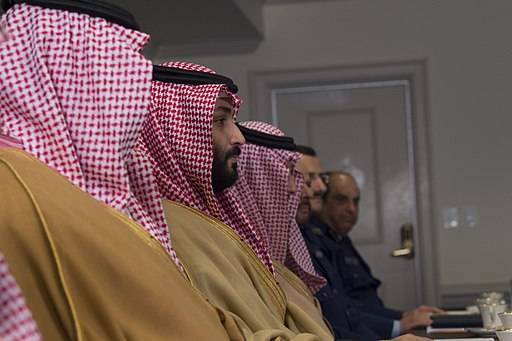
Saudi Crown Prince Mohammed bin Salman bin Abdulaziz at the Pentagon in Washington D.C., 2018 (Source: Kathryn E. Holm/Wikimedia Commons)
Want to get the Morning Brief by email? Click here to sign up.
A dramatic diplomatic spat erupted over the weekend between Lebanon and Saudi Arabia as well as other Gulf states. On Friday evening, Saudi Arabia announced that it was recalling its ambassador from Beirut, asking Lebanon’s envoy to leave Riyadh and stopping all imports from Lebanon. Kuwait, Bahrain and the UAE followed suit with their own calling back of ambassadors. Qatar, for its part, has urged Lebanon's leadership to take immediate steps to repair ties with Gulf neighbors. The row comes after Lebanon’s information minister spoke about the war in Yemen in an Aug. 5 interview, taped before the cabinet was formed but aired just last week. Kurdahi called the conflict in the country “absurd,” adding that Houthi fighters, opposed by Riyadh, were “just defending themselves and not attacking anyone.” A crisis cell of Lebanese ministers gathered on Saturday to discuss the problem, with one minister stating that Lebanon could not afford to allow the cabinet to quit. Foreign Minister Abdallah Bou Habib said after the meeting that Lebanon’s international partners oppose the resignation of Najib Mikati’s cabinet over the incident. Meanwhile, Saudi Arabia’s foreign minister told CNBC yesterday that his government had concluded that "Hezbollah’s continuing dominance of the political scene" rendered any dealings with Lebanon unproductive, adding that his country's assessments on Lebanon were based on more than simply Kurdahi's remarks.
Kurdahi insisted yesterday that his resignation was “out of the question.” His political patron, Marada Movement leader Sleiman Frangieh, said Saturday while the under-fire information minister offered his resignation, “my conscience does not allow me to ask such a thing from a minister who did not make an error.” Hezbollah politicians also jumped to Kurdahi’s defense over the weekend, with MP Hasan Ezzeddine (Hezbollah/Sur) saying that Saudi Arabia used the minister’s remarks "as a pretext to threaten the Lebanese and intervene in their domestic matters." Former premiers Fouad Siniora, Tammam Salam and Saad Hariri, the leader of the Future Movement, all called for Kurdahi’s resignation. Hariri, for his part, castigated Hezbollah for coming to the defense of Kurdahi, marking a public degradation of ties, cordial in past years, between the Future Movement and Hezbollah. President Michel Aoun, meanwhile, said in a tweet on Saturday, a day after the kingdom asked Lebanon's ambassador to leave, that he is “keen to establish the best relations” and “sign bilateral agreements” with Saudi Arabia.
The Lebanese Army reported on Sunday that it has foiled another attempt to smuggle people from northern Lebanon by sea. A naval patrol detained 54 people — 25 men, 9 women, and 20 children — on Bellane Island, off the coast of Tripoli, around 5 p.m. on Saturday, Oct. 30, according to a Lebanese Army statement. The army added that one of its maritime patrols was able to save nine Syrian nationals who were aboard a sinking boat heading to Cyprus. “Other patrols also seized three boats that were used to smuggle people across the sea, and arrested a number of smugglers on board,” the statement said. UNHCR on Sep. 18 said that it was “deeply concerned by the spike in self-organized movements by boats to Cyprus,” noting that there have been at least 21 attempts to sail Syrians, Lebanese and migrant workers from Lebanon to Cyprus between July 14 and September. Amid a crackdown by Lebanese and Cypriot authorities on illegal crossings, some refugees attempting to leave Lebanon have turned to other routes, including a dangerous overland route through Syria to Turkey via Idlib and, in recent months, many have attempted to enter the European Union via Belarus. On Sunday, Lebanese army chief Joseph Aoun departed for a visit to the US, after an invitation by US Chairman of the Joint Chiefs of Staff Gen. Mark Milley, to discuss methods from the US to support the Lebanese Army. Earlier this month the US contributed $67 million in support of the army.
Egypt will begin exporting natural gas to Lebanon by the end of 2021, as part of a US-backed strategy to assist ease the country's power shortages, according to Egypt’s energy minister Tarek El Molla. In an interview with CNBC, El Molla stated that Egypt is ready to begin providing natural gas by the end of the year, explaining that Egypt generates between 7 and 7.2 billion cubic feet of gas each day. El Molla's remarks came after Lebanon, Jordan, and Syria agreed on Oct. 28 to provide Lebanon with 400 Megawatts of power per day via grid interconnections extending through Syria, with the supply set to begin in early 2022.
Najib Mikati will head Lebanon’s delegation to the 2021 United Nations Climate Change Conference (COP26) starting today in Glasgow. The premier will be accompanied in his trip to Scotland by Environment Minister Nasser Yassin and Foreign Minister Abdallah Bou Habib. On Oct. 26, following a meeting preparing for the summit, Mikati’s office issued a statement that “the climate change crisis is of great importance on the global agenda.” France24 reported that Mikati would meet with French President Emmanuel Macron on the sidelines of the conference in Scotland.
Tuesday will mark three weeks since Lebanon’s cabinet last met, with sessions suspended due to a political row over the investigation into the 2020 Beirut port investigation. Mikati said on Oct. 26 that he looks forward to “resuming cabinet sessions as soon as possible,” two weeks after the last session in which Shiite ministers demanded the government take a stance regarding Judge Tarek Bitar’s probe. The Maronite Patriarch conducted a round of shuttle diplomacy that same day between the president, speaker of the parliament and prime minister last week in a so-far unsuccessful attempt to find a political solution to the impasse.